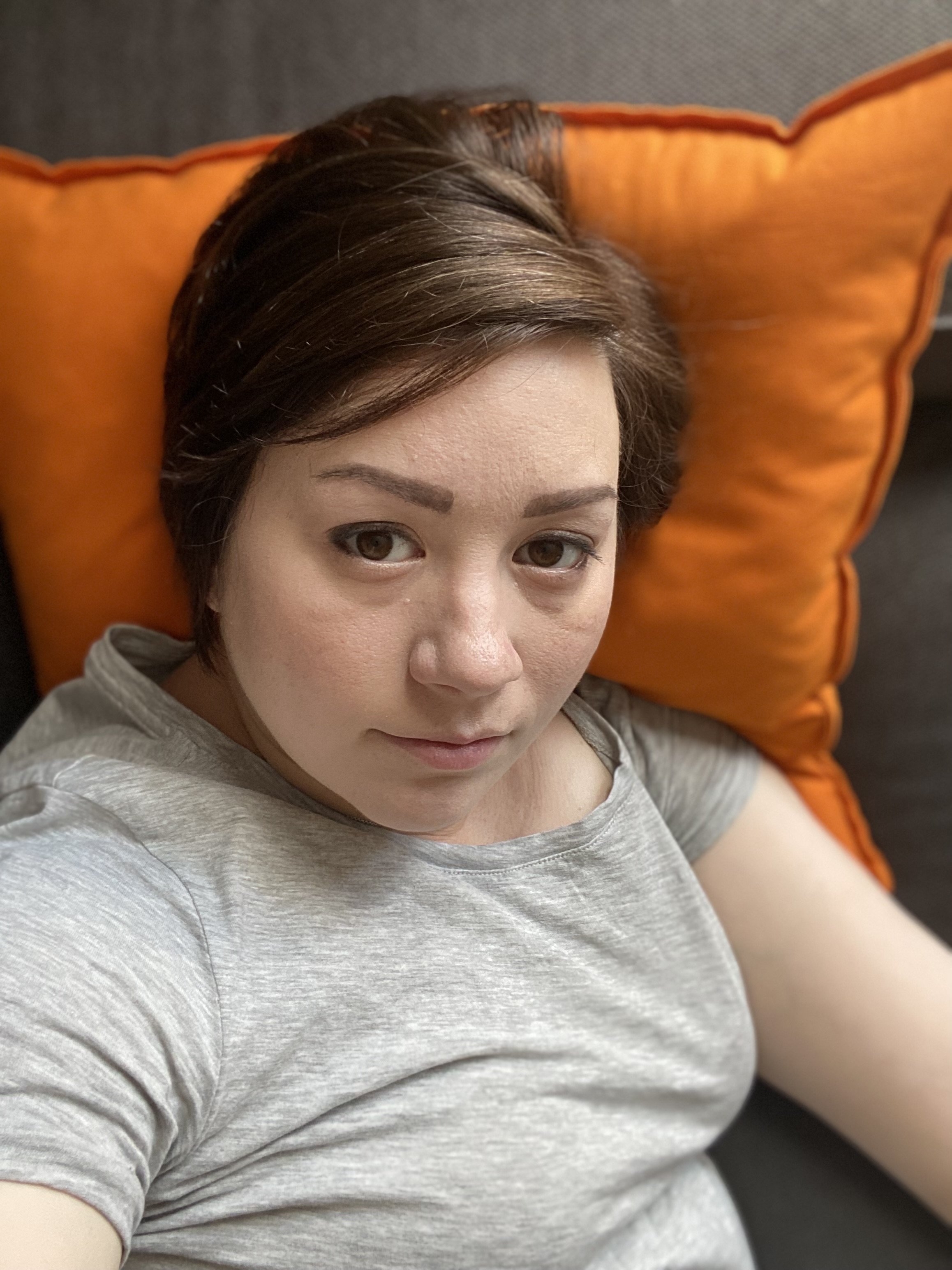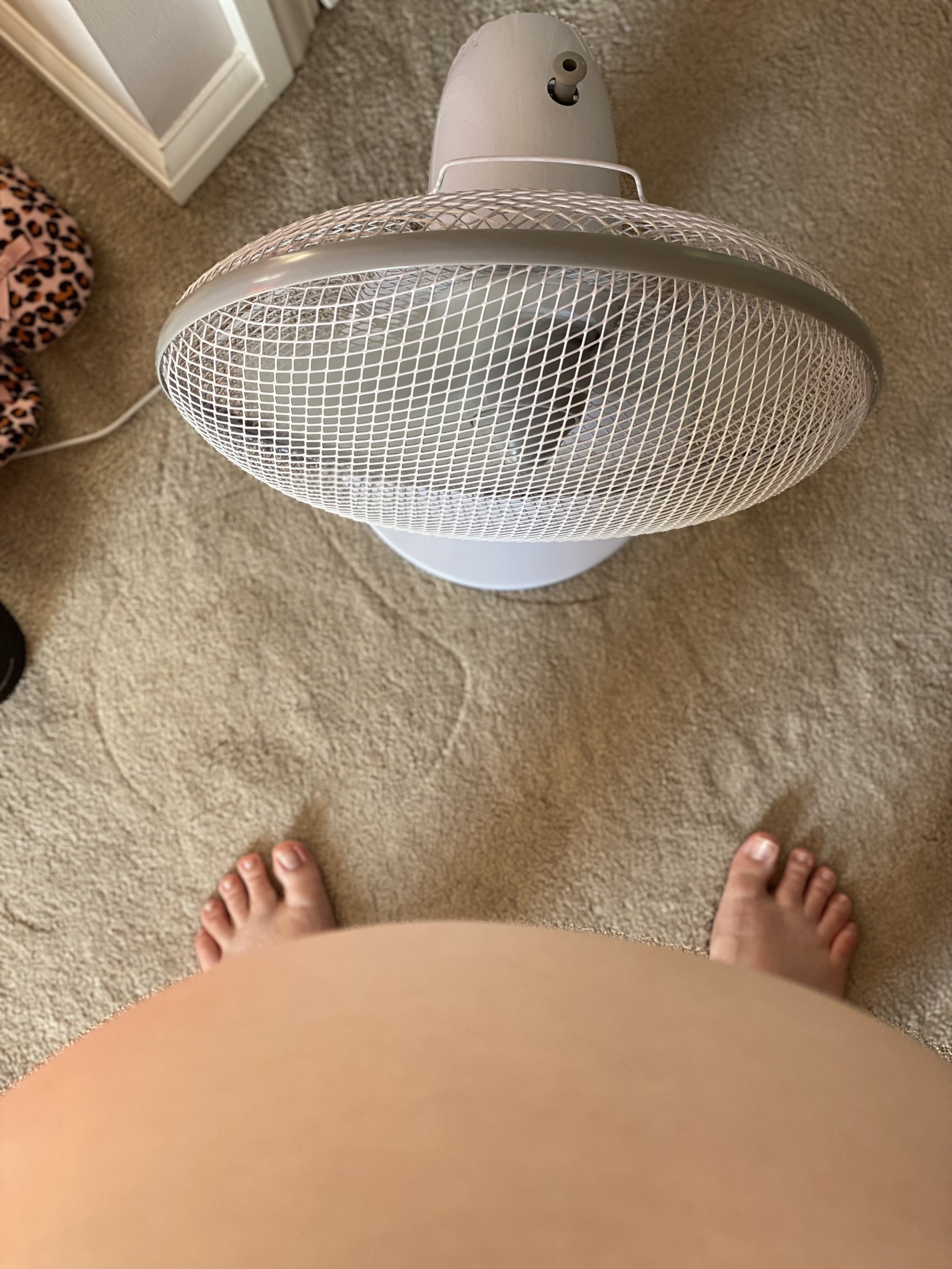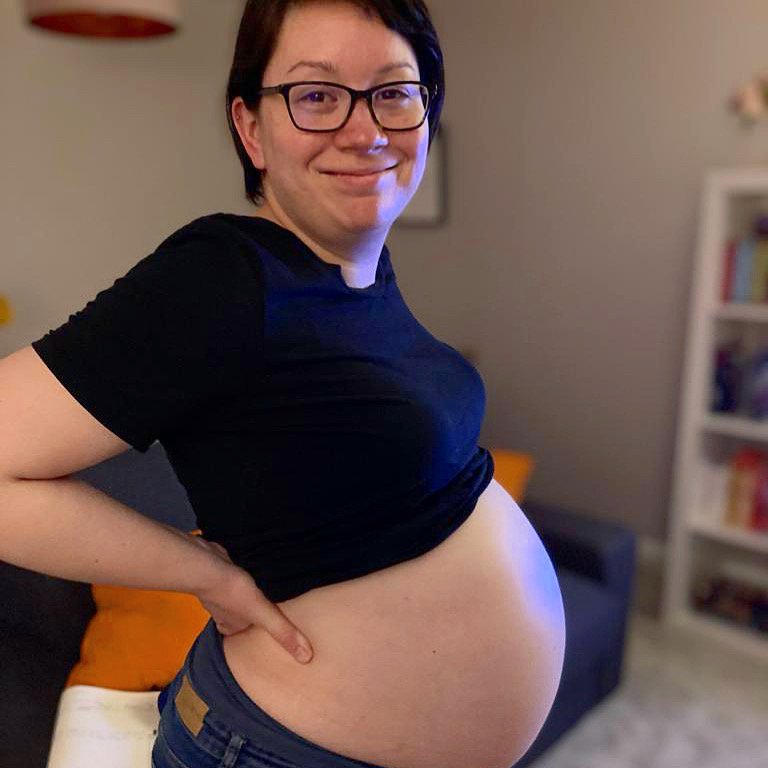Navigating pregnancy with a chronic illness
Little Smudge has a surprise
I thought I'd share a little series about my experience of being pregnant, giving birth, and learning to be a new mum with a chronic illness. When I fell pregnant with the Bean, I searched and searched for some info or even blog posts sharing other people's experiences, but came up fairly empty. This one is about dealing with all the joys of pregnancy alongside your symptoms, but there'll also be a post on what it's like to give birth, and also as a new mum when you're dealing with these things shortly, too. These episodes are a little longer than my usual posts, so grab a drink and get comfy. Hopefully this insight might be helpful to a few of you.
A quick disclaimer before we start: I am in no way a medical professional, nor can I give advice on any of this. I'm just relaying my experiences and how these things affected me. If you find this useful, then great! But please do speak to your doctor if you have any concerns or think you might be dealing with similar issues.
TLDR: I think it's good to go into having a baby as prepared as you can be: the more strengthening and exercise you can give your body in the months and years prior to getting pregnant, the better. Make sure to advocate for yourself all the way along - if there's anything you really do/don't want (as long as it's safe for you and the baby), tell those around you: your partner/birth partner, medical professionals etc, so that they can do their best to provide what you need.
Getting started
It took me a long while to fall pregnant. During the process, I discovered I have Polycystic Ovary Syndrome (PCOS), something that makes sense now, but I would never have thought I'd been suffering with before being diagnosed with it. I was given a drug called Metformin - something I'd heard of being used for treating Diabetes - to help dampen the symptoms, but they really messed my body up, so I was very glad when my GP told me to stop taking them, as they didn't seem to be doing anything positive for me. We got super close to having to go to a fertility specialist, but thankfully, after 18 months, we got the most wonderful news: we were going to have a baby!
I must say, the process of getting pregnant was not the most fun in the world - the waiting, having to go through a number of embarrassing medical procedures, and discuss your most intimate bodyparts and experiences etc with strangers. It also upset me a lot how weight centric the healthcare system is: if you're over a certain weight, a fertility specialist won't even see you until you've dropped pounds to get below the threshold (even if you're on that threshold). In the UK, we're very lucky to have the NHS, and I'm super grateful for their care throughout my pregnancy, but I do want to caveat that with how biased many healthcare professionals and systems are within it, both as someone who's a little on the heavier side and has a disability/chronic illness. I also struggled mentally each month, as I'm sure many people who wish to conceive do, as having PCOS means that your cycle is all over the place and there are many months where you think "finally, this is it!" only to experience crushing disappointment when you discover you're just super late again. However, once you do finally fall pregnant, it does get much better.
A few years prior to conceiving, I was able to see a Physiotherapist who specialises in Ehlers-Danlos Syndrome (EDS). They recommended that if I did want to have children, when I first become pregnant, I should ask for a referral back to them for assistance with things like Pelvic Girdle Pain (PGP). I dilligently requested the referral from my GP as soon as I told them I was pregnant. Annoyingly, due to the global pandemic we've all been experiencing, I had to wait 14 weeks for an appointment, and by that point, I'd already fallen ill of the dreaded pelvic issues. All of my physio appointments were via Zoom, which I didn't find particularly helpful, and I struggled quite a lot with walking in the latter months of my final trimester.
Thankfully, that was probably one of the worst things I had to deal with. I had very minimal nausea in the first trimester and was able to keep quite active throughout the first and second. Other than some acid reflux later on, I really got away lightly with any of the not so nice symptoms people usually experience during pregnancy.
A growing bump (about 6 months)
The trimesters
EDS and dysautonomia symptoms
Despite your body being flooded with the hormone, Relaxin, during pregnancy - something that really doesn't benefit people with EDS, as we already have too much laxity in our joints - I didn't find I had too many more subluxations and dislocations. My collarbones floated in and out of place a bit more than usual in the first trimester, but they often do that, so I'm used to it. My pain actually got a little better. From weeks 12 to about 28, any dysautonomia symptoms I had alleviated, which was great. These usually include (for me, at least):
Heart palpitations
Dizziness
Feeling faint or nauseous
They did reappear in the third trimester, perhaps as you can have similar symptoms in pregnancy anyway, and I found I had to take things a bit easier when they were bad. I remember sitting on our bed doing my makeup one morning and my heart rate spiked to over 110bpm (as my Apple Watch alerted me), which was interesting! I spent a number of hours in the third trimester laid on the couch with my legs up on the back, sticking a bit of salt under my tongue to try and raise my blood pressure slightly.
When I spoke to the midwives on booking into their services, they got a bit nervous when I told them I had EDS. One of the types is Vascular EDS, a rare and often deadly form of the condition, which can cause premature rupture of the uterus and excessive bleeding. Thankfully, I don't have that type (it's identified much earlier in someone's life), and despite being put under a consultant to monitor me, they were happy that I didn't need to be considered a 'high-risk' pregnancy, which I was grateful for.
As I mentioned earlier, I got hit with Pelvic Girdle Pain (PGP) at about 8 weeks pregnant, which didn't get better until I gave birth. In 2019, I decided I was going to get really fit and strong - ready to start planning for a baby - to give my body the best fighting chance. 2020 hit, and with all the lockdowns, all of my work from the year before went out of the window: we EDS'ers decondition very quickly and it's incredibly hard and time consuming to build your fitness and strength back up again. Despite trying my best to exercise and stay strong throughout that year, and during pregnancy, I really didn't do enough to build my muscles back up to where they'd been, so my hips and pelvis weren't strong enough to stay in place like they should normally.
I had a little scare at about week 14 when I had the most awful pain in my groin/pelvis. It was so bad, it brought me to tears and I couldn't get off the floor, crumpled in a little heap, sobbing. I was worried I was losing the baby, so fearing the worst, we quickly called 111 for help. After 4 hours, a couple of paramedics came to find out what was wrong. Thankfully, I'd had no bleeding, and the pain did ease slightly, so after a thorough check up, they decided I would probably be okay to just see the midwife team the next day. All my scans were clear and the baby's heart was strong; it was just a random blip that no-one could really explain. The physio thought it could've been a spasm in my piriformis muscle, though I've never experienced pain like it (other than giving birth, although that's a bit different). I was just so glad that was it, as the outcome could've been much worse.
Fed up of the lightheadedness and heart palpitations, resting on the sofa with my feet up on the side (out of shot)
Cravings, swollen feet and the other usual suspects
Despite the cliche being that women always experience really strong food cravings, I didn't actually have any particular foods I was desperate to have. The only thing I did crave sometimes was junk food (not great, I know!) - I think it was the lack of energy on top of my usual fatigue. I didn't go mad, but every so often, we did a quick KFC run or Dave would nip out to the shop to get me something I fancied. I ate smaller meals more often during the day, needing to snack, particularly during the first trimester. Crackers and cereal bars kept me going in the first few weeks!
I didn't have any major swelling, but my feet got quite puffy in the latter months. It didn't help that it was summer, but at least I could walk around barefoot in the house and wear flip flops when I was out. My feet have gone up a whole size since then, and despite already being on the wider side, are now too wide for many of my favourite shoe brands, which is a bit annoying! Apparently, they don't often go back to their normal size, either...
One thing that did surprise me was the fact that I couldn't sit still. I've since discovered I most likely have ADHD (will go into more detail on this in a later post) and am currently awaiting an assessment for it, but to the dismay of both Dave and my Mum, they could not get me to rest up at all. I wanted to keep busy and do things - probably to do with the nesting phase - but they kept telling me to sit down, much to my annoyance. I wanted to sort the baby's room and batch cook meals for after they arrived. NB: Batch cooking is something I highly recommend doing to save yourself aggrovation when you're trying to figure out life with a tiny person later on. However, don't be like me! Make sure you take the time to rest when you can get it. You really won't have time once they're here (like everyone always tells you). It's so cliché, but very true.
Pregnancy in summer is not the one...
It's all downhill from here (or so it seemed at the time)
I really wanted to give birth as naturally as possible. The idea of interventions and c-sections terrified me all the way up until actually giving birth. I was adament I wouldn't be having anything like that, if I could help it. Little did I know, I'd be giving it all a go! We went through the hypnobirthing course by The Positive Birth Company, run by Siobhan Miller, which had some great information that the NHS only minimally covers, such as how to deal with going into labour and the birthing experience. However, I do think it gave me some false expectations of how much influence I could have over the birth: i.e. it's really very little. Your body is going to do its' own thing and when that baby wants to come out, they will...and in the way that they want to, not how you want them to.
As we hit the final week or so, I had to go for a couple of extra scans to make sure the bub was doing okay. They'd discovered her torso was looking a little on the wider side and were worried I'd need to have an intervention in case she got stuck. They said she could end up in shoulder dystocia, which is where the baby's shoulders get stuck in the pelvic structure. My dream of being at the midwife centre to give birth was narrowing, but the head midwife at the centre reassured me she'd delivered many babies with the issue and it shouldn't be a problem. That was up until my final midwife appointment.
My usual midwife was on holiday and had been replaced by a new lady. Although she was very nice, she noticed something on my notes that meant I wouldn't be able to give birth at the centre, and would instead need to go to the main hospital. I was devastated. I remember bawling my eyes out in the car park and all the way home, while Dave tried in vain to comfort me. When we got home, we chatted with my Mum about it, and they tried to reaassure me that it would still be a natural birth and everything would be okay. There is a midwife centre at the hospital, which gave me a little hope.
A few days later, I had another scan, which showed the same results as before, but nothing else that was problematic. Despite this, I had to go and speak to a consultant before being discharged. We waited to be seen in a hot and severely crowded waiting room with the most uncomfortable seats for over 10 hours. About 3 hours in, Dave went home to go and grab some things for me, and to take our food shop home, as we'd gone to get it prior to the appointment, not expecting to be more than half an hour. There was a medical emergency and all of the consultants on duty had to go pitch in. After about 7 hours, Dave and I tried to leave, but they heavily implied I wouldn't be able to go until I'd seen the consultant and refused to give me my notes. We implored them a number of times to let me go home and kept being told that "it'd only be a little bit longer." 3 hours later and we were finally taken in to see a consultant.
During the wait, I spoke to a few of the women there, one of whom had been told she would have to have an induction. They were doing this because she was over a certain weight and had got to term, but other than that, had no health indications to require it. After doing a little research when I got home, it turns out Bristol and the South West have unusually high rates of instigating inductions in pregnant women, many of which turn into c-sections or other medical intervention-based births. As it turned out, this was what they kept me in for: to tell me I would need an induction, as the baby could have shoulder dystocia and they wanted to control the birth. I flat out refused unless the baby was in danger. They agreed they weren't and I went home fully expecting to have the birth that I wanted: a non-medicalised vaginal birth that had very few interventions and would be in a peaceful environment, all dimmed lights and nice smells, my own music on and only one or two midwives involved. How wrong I was!
Excited for the baby to appear
Don't worry, it actually wasn't as scary as I'm building up to. I felt weirdly calm, despite the circumstances and I would definitely do it again, if we can. You can read the next edition in this series, where I discuss what it was like giving birth (sans gory details, I promise!).





